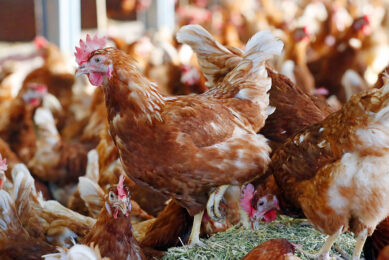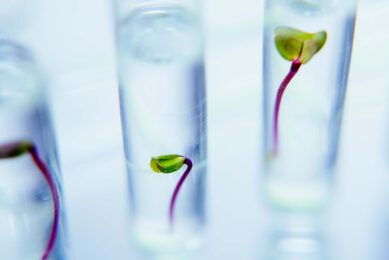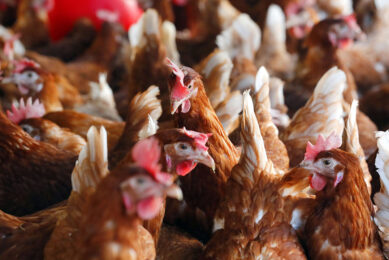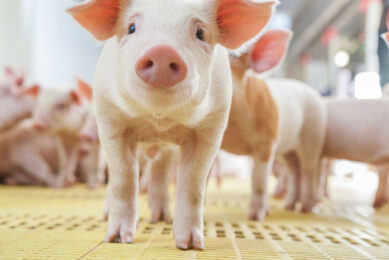Securing a safe and stable probiotic strain

A natural spore-forming Bacillus subtilis DSM 32315 strain has shown to be safe for commercial poultry application, stable under commercial feed manufacturing process and pelleting conditions and stable in adverse storage conditions with no loss of spores.
Bacillus subtilis (B. subtilis) is a rod-shaped, Gram-positive bacterium, commonly found in the soil and normal gastrointestinal tract of humans and animals. It is a facultative anaerobe and historically has been considered as an obligate aerobe. As with other members of the genus Bacillus, it is favoured for use as a probiotic or direct-fed microbial (DFM) in poultry feed because of its ability to form endospores and survive the temperature and pressure of pelleting. Each strain of B. subtilis has unique characteristics that can determine its function and efficacy.
Therefore, information regarding a particular strain cannot be generalised to all B. Subtilis. From a practical standpoint, the efficacy of a probiotic may be limited by factors which can affect its application under commercial conditions.
Bacillus subtilis DSM 32315 is a strain of probiotic selected from hundreds of naturally occurring Bacillus spp. isolates. Its selection process was based on strict multi-parameter step process. These processes included safety assessment, heat stability, and viability in the chicken digestive tract. Here, the focus is on 2 of these multi-parameter step process: (1) Safety assessment and (2) heat stability.
Safety assessment
Although micro-organisms used as probiotics in animal feed are generally recognised as safe, certain risks may still be associated with some probiotic strain. These include presence of transmissible antibiotic resistance genes, presence of plasmids or mobile genetic elements that are transferable among bacterial population present within an environment, and presence of toxin genes e.g. enterotoxins. Therefore, it is important to assess, at the strain level, the safety of the micro-organism considered for use as a probiotic in animal feed.
B. subtilis DSM 32315 was assessed for toxin related genes using B. cereus reference genes (EFSA Journal, 2014) and was shown to contain no haemolytic enterotoxin (nheABC), hemo- lysin (hblCDAB), cytotoxin (cytK), or cereulide (cesA) genes. In addition, B. subtilis DSM 32315 was evaluated for the presence or absence of plasmids, as well as antibiotic resistant genes, based on comparison using the Comprehensive Antibiotic Resistance Database (CARD). There were no plasmid sequences or relevant antibiotic resistance genes identified, and this was validated by MIC assays (EFSA Journal 2012). Based on this information, it was determined that B. subtilis DSM 32315 is safe to be used as a probiotic in animal feed.
Heat stability in feed processing
Feed pelleting is a mechanical process that ensures that small feed ingredients particles are agglomerated into larger particles by applying moisture, heat, and pressure. It has been recognised that pelleting poultry feeds improves feed intake, weight gain, and feed efficiency. This may be attributed to improved feed palatability, nutrient uniformity, and alterations in ingredients such as modification of starch and protein. However, the pelleting process can be detrimental to certain feed ingredients, thereby impacting the availability of nutrients for growth.
Direct-fed microbials are a class of feed additive which can be affected by the pelleting process. For example, non-spore forming DFMs, such as species of Lactobacillus, Bifidobacterium, Enterococcus, and Pediococcus show a relatively low heat stability compared to spore-forming Bacillus sp. probiotic. It is important that a probiotic remains stable throughout feed processing, transport, and storage, so that when fed to the animals it can exert its activity. Therefore, 2 trials were conducted to demonstrate the stability of B. subtilis DSM 32315 spores in commercial feed processing, and storage conditions.
Survivability rate of B. subtilis DSM 32315
The objective of the first trial was to evaluate the survivability and rate of survivability of B. subtilis DSM 32315 under a commercial feed manufacturing process. Bacillus subtilis DSM 32315 spores were mixed into formulated broiler starter feed for a final expected in-feed concentration of 1×106 CFU/g feed. In order to test the survivability of spores through feed pelleting, total spores were counted from 10 mash feed samples obtained immediately after mixing and then from another 10 samples obtained after the mash feed had been conditioned for 6 minutes and subjected to different pelleting temperatures: 186°F (85.5°C), 190°F (87.7°C), and 195°F (90.5°C), (4 trial groups; 10 samples/each trial group = total of 40 samples).
All samples were analysed for viable spore counts using a dilution plate series culture method. Spore counts were reported as the Log10 transformation of colony forming units per gram of feed (Log10 CFU/g feed). Results were statistically analysed in JMP v13.1.0 (SAS Institute Inc.), and statistical significance was determined at P ≤ 0.05. There was no significant difference (P = 0.761) in viable B. subtilis spores between the mash feed and all pelleted feed obtained from the same source (Figure 1a). The recovery of viable spores was at the expected levels in all pelleted feed in comparison to the control mash feed (Figure 1b). This result indicates that B. subtilis DSM 32315 can survive long conditioning time and high pelleting temperature. A high survival rate during commercial feed processing ensures that an adequate number of viable spores is present in the finished feed, thereby providing the desired benefits.
Figure 1a – B. subtilis DSM 32315 spore enumeration shows no loss of spores in feed from same source before and after pelleting at different temperatures.

Figure 1b – Percent recovery of spores from feed at different pelleting temperatures in comparison to the control feed shows that B. subtilis DSM 32315 spores are stable at high pelleting temperatures.

Ability of B. subtilis DSM 32315 to remain viable
The objective of the second trial was to evaluate the ability of B. subtilis DSM 32315 spores to remain viable under adverse storage conditions. For this trial, B. subtilis DSM 32315 spores were mixed in broiler feed for a final expected in-feed concentration of 1×106 CFU/g feed. Broiler feed was first pelleted at 185°F (85°C). The viability of spores was evaluated in 3 replicate feed samples directly after pelleting and again after 2, 4, 8, and 12 weeks of storage at 104°F (40°C), and 80 % humidity. Results obtained from this trial showed that there was no significant difference (P = 0.286) in viable B. subtilis DSM 32315 spores at 0, 2, 4, 8, or 12 weeks of storage (Figure 2).
Figure 2 – B. subtilis DSM 32315 spore numeration in feed shows no loss of spores following feed storage under adverse conditions for several weeks.

References available on request
By Bayo Sokale and Anita Menconi, Technical Services Managers, Evonik Industries






